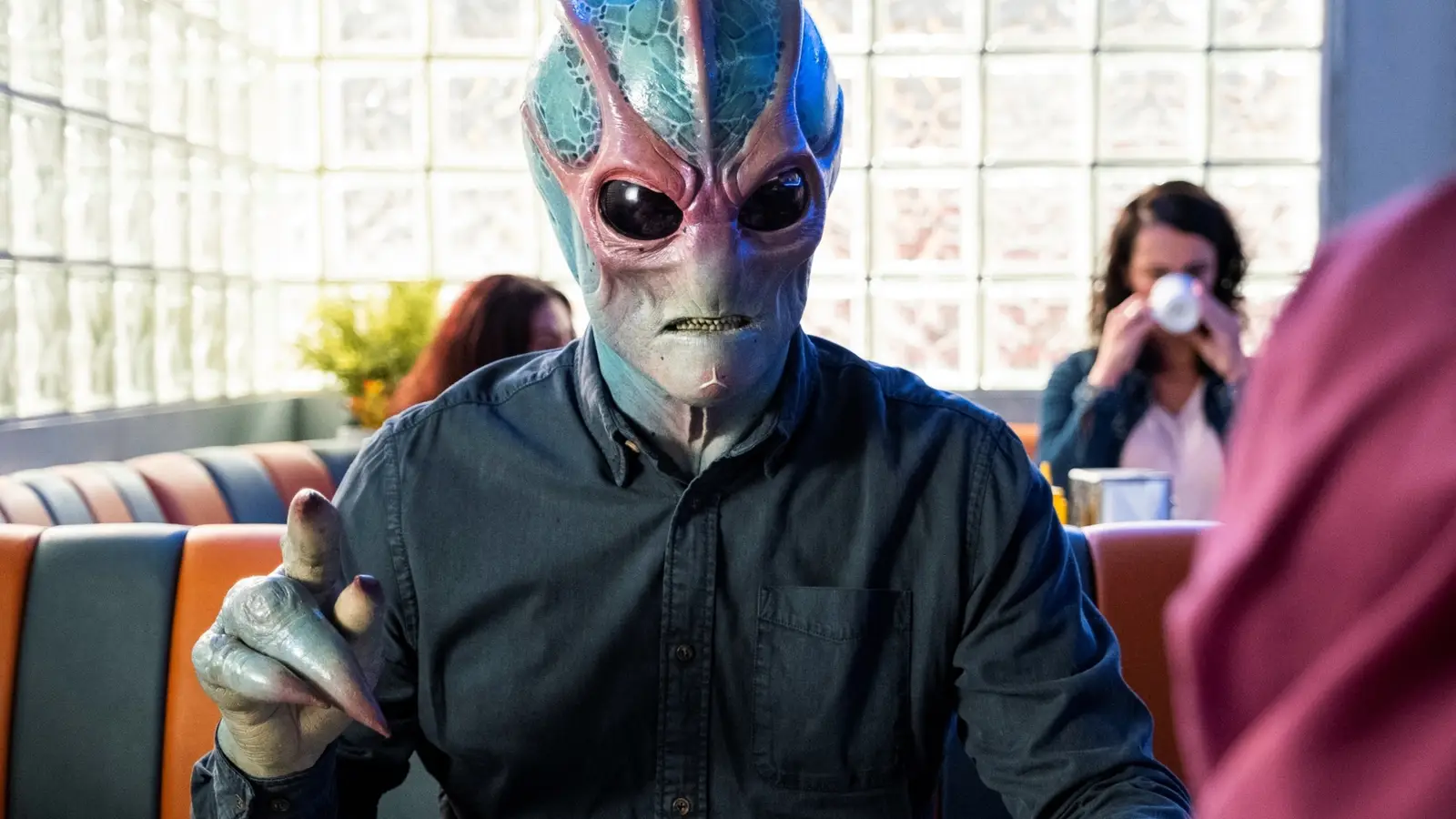
Many of the best sci-fi TV shows are sprawling epics that run for years, sometimes even decades. From long-running space sagas to ever-expanding futuristic worlds, many icons of sci-fi prove that the genre thrives on grand storytelling. However, a great sci-fi show with a short run can be just as powerful.
Some of the most memorable sci-fi TV shows told their stories with clarity and precision, opting for high-quality narratives rather than overlong runs. Many of these short-lived shows, whether through design or cancellation, represent the very best the genre has to offer. Their brevity often heightens their resonance, ensuring each season and episode delivers with purpose.
For fans seeking bingeable sci-fi shows without the burden of long-term investment, there’s a wide range of excellent options. These series prove shorter doesn’t mean lesser, with many standing as pinnacles of the genre. Their compact storytelling offers immediate thrills while still showcasing the limitless imagination of sci-fi on the small screen.
Resident Alien (2021-2025)
A Clever Mix Of Small-Town Comedy And Sharp Sci-Fi Drama
Resident Alien made its mark by balancing heartfelt humor with inventive science fiction. The series follows Harry Vanderspeigle (Alan Tudyk), an alien forced to pose as a small-town doctor. Across its four seasons, the show cleverly blends fish-out-of-water comedy with deeper themes about humanity, morality, and belonging.
Its run feels perfectly paced, with each season peeling back layers of Harry’s character while developing a quirky, lovable supporting cast. The series never overstayed its welcome, and its final season brought closure without dragging the concept thin. In an era where many shows expand endlessly, Resident Alien stood out for knowing exactly when to bow out.
While many fans want the story to continue, Resident Alien is now one of the most binegable sci-fi shows thanks to its mix of serialized alien-invasion drama and character-driven humor. The balance of spectacle with genuine warmth ensures it remains one of the most refreshing modern sci-fi shows, and the fact it’s under five seasons feels like a strength in the age of streaming.
Humans (2015-2018)
A Chilling Near-Future Tale About AI And Humanity
Humans presented a disturbingly grounded vision of the future where synthetic androids known as “synths” integrate into society. Featuring performances from the likes of Katherine Parinkson as Laura Hawkins and Gemma Chan as synth Anita/Mia, this underrated UK sci-fi explored themes of identity, consciousness, and what it means to be alive.
Its three seasons provided just the right amount of space to tell its story without stretching the premise too far. The series ended while still feeling timely and sharp, delivering a conclusion that reinforced its haunting commentary on AI and human dependence on technology.
Humans works particularly well as a binge because of its tense, serialized plotting. The balance of family drama and cerebral speculative sci-fi ensured it was both emotionally gripping and intellectually stimulating, making it one of the strongest modern sci-fi miniseries disguised as serialized television.
12 Monkeys (2015-2018)
A Complex Time-Travel Saga With A Rare Perfect Ending
Based on the 1995 film, Netflix’s 12 Monkeys expanded the story of James Cole (Aaron Stanford), a scavenger from a plague-ravaged future sent back in time to prevent humanity’s downfall. Joined by virologist Dr. Cassandra Railly (Amanda Schull), Cole becomes embroiled in an intricately plotted war across timelines.
Over four seasons, the show developed into one of TV’s most tightly woven time-travel narratives. Unlike many series that meander or collapse under paradoxes, 12 Monkeys used its limited run to methodically build toward a satisfying, emotional finale. Its concise length made it bingeable without overwhelming viewers with unnecessary detours.
What makes it stand out is its commitment to character and storytelling discipline. Every season served the larger arc, and the final payoff felt earned. For fans of smart, emotional sci-fi, 12 Monkeys is one of the best examples of a series that thrived precisely because it knew when to end.
Firefly (2002-2003)
A Short-Lived Space Western That Became A Cultural Phenomenon
Few canceled series have left as big a legacy as Firefly. Created by Joss Whedon, the show followed Captain Malcolm Reynolds (Nathan Fillion) and his ragtag crew aboard the Serenity. Its mix of western grit and futuristic storytelling created a genre-defying tone that fans still celebrate decades later.
Although it only lasted one season, that brevity is part of what made Firefly so enduring. With just 14 episodes, every moment feels essential, and its short run allowed for tight worldbuilding without filler. While its cancellation left many wanting more, its cult status proves quality often outweighs quantity.
Firefly captures a lived-in universe with compelling characters and rich storytelling in just a handful of hours. It may not have lasted long, but its influence continues to shape the genre, reminding fans that some of the best sci-fi stories are the shortest-lived.
Upload (2020-2025)
A Satirical Yet Heartfelt Exploration Of Digital Afterlife
Amazon Prime Video’s ambitious sci-fi Upload imagines a world where human consciousness can be preserved in a digital afterlife. Starring Robbie Amell as Nathan Brown, a programmer whose mind is uploaded into a luxurious virtual reality, the show mixes biting satire with touching human drama.
Over its four-season run, Upload leaned into both its comedic and speculative sides, balancing critiques of tech-driven capitalism with an emotional romance between Nathan and customer service rep Nora Antony (Andy Allo). The show’s concise run ensured its core mystery and love story reached a satisfying end without overstaying its premise.
Its short length also makes it a highly bingeable sci-fi series. By keeping its episodes brisk and tightly plotted, Upload manages to deliver both a futuristic thought experiment and a heartfelt love story that resonates long after the credits roll.
Sense8 (2015-2018)
A Bold, Global Sci-Fi Series About Human Connection
From creators Lana and Lilly Wachowski, the hidden Netflix sci-fi gem Sense8 follows eight strangers from around the world who suddenly become mentally and emotionally linked. The cast, including Will Gorski (Brian J. Smith) and Nomi Marks (Jamie Clayton), embodied a show that was as much about empathy and unity as it was about science fiction spectacle.
Though it only ran for two seasons and a concluding film, its brevity heightened its impact. The Wachowskis created a series that was ambitious and sprawling, yet its limited run ensured it remained emotionally charged without dilution. Each episode emphasized character bonds over prolonged worldbuilding.
Sense8 remains one of the best modern sci-fi shows thanks to its balance of action, mystery, and heartfelt drama. It captured themes of identity and connection with a scale few series attempted, making it unforgettable despite – or perhaps because of – its short life.
Andor (2022-2024)
A Gritty, Grounded Star Wars Story With Unmatched Focus
Andor proved that the Star Wars galaxy could deliver prestige television. Following Cassian Andor (Diego Luna), the series traced his journey from reluctant survivor to key rebel figure, offering a grounded, politically charged take on the birth of the Rebellion.
Its two-season structure was deliberate from the start, giving the writers freedom to craft a complete, controlled narrative. Instead of stretching indefinitely, Andor used its limited run to explore themes of oppression, resistance, and sacrifice in meticulous detail. This clarity of vision made it one of the most critically acclaimed Star Wars projects ever.
Because of its cinematic production quality, gripping writing, and concise design, Andor is perfect for a focused binge. It demonstrates that even within a sprawling franchise, a sci-fi series can achieve greatness with fewer seasons by leaning on precision, not scale.
Battlestar Galactica (2004-2009)
A Reimagined Space Opera That Reshaped Modern Sci-Fi Television
Ronald D. Moore’s Battlestar Galactica reboot became one of the defining sci-fi shows of the 2000s. Following Commander Adama (Edward James Olmos), President Roslin (Mary McDonnell), and the remnants of humanity as they flee the Cylons, the series combined political allegory, action, and human drama at a grand scale.
Its four-season run struck a perfect balance between epic storytelling and narrative control. Unlike many long-running franchises, Battlestar Galactica delivered a complete arc without spiraling into unnecessary extensions. The ending may be divisive, but its ambition and cohesion remain undeniable.
A masterpiece that in many ways hasn’t been topped despite ending well over a decade and a half ago, Battlestar Galactica remains a highly bingeable sci-fi epic because of its serialized nature, gripping cliffhangers, and layered characters. By limiting its run, the series became a rare mix of expansive worldbuilding and narrative discipline, standing as one of the best sci-fi shows under five seasons.
Dark (2017-2020)
A Time-Bending Masterpiece Of Mystery And Emotion
Netflix’s Dark is a rare example of a show that planned every twist in advance and stuck the landing. Set in the small German town of Winden, the series begins with a child’s disappearance before unraveling into a multigenerational, time-travel epic involving Jonas Kahnwald (Louis Hofmann) and the secrets of his family.
Across three seasons, Dark delivered one of the most intricately plotted sci-fi mysteries in television history. Its short length was a blessing, ensuring its puzzle-box narrative never collapsed under its own weight. Each season had a clear purpose, culminating in a finale that felt both inevitable and satisfying.
What makes Dark so masterful is its use of suspense and emotional resonance, and how it perfectly folds them into an intricate time-travel-based narrative. It proves that a sci-fi series doesn’t need a long run to achieve greatness – sometimes, three perfect seasons are all it takes.
Star Trek: The Original Series (1966-1969)
The Groundbreaking Space Adventure That Set The Sci-Fi Standard
Few shows reshaped the sci-fi genre like Star Trek: The Original Series. Introducing audiences to now-iconic characters like Captain James T. Kirk (William Shatner), Spock (Leonard Nimoy), and the crew of the Enterprise, the series took audiences to strange new worlds while tackling social issues through allegory and futuristic storytelling.
Its three-season run was surprisingly short for a show of such legendary status, but its brevity played to its strengths. The series never had the chance to stagnate, and its compact episode count made it a perfect entry point into the vast Star Trek franchise. Every story feels like a building block for the genre’s future.



